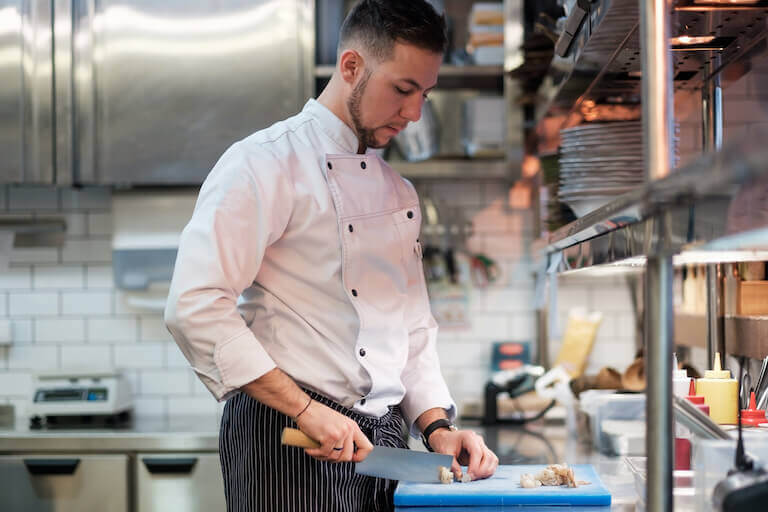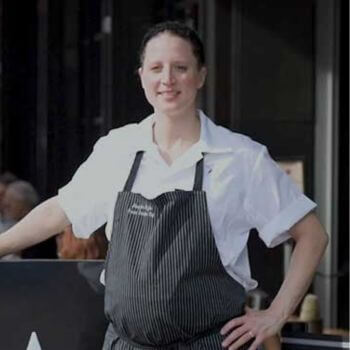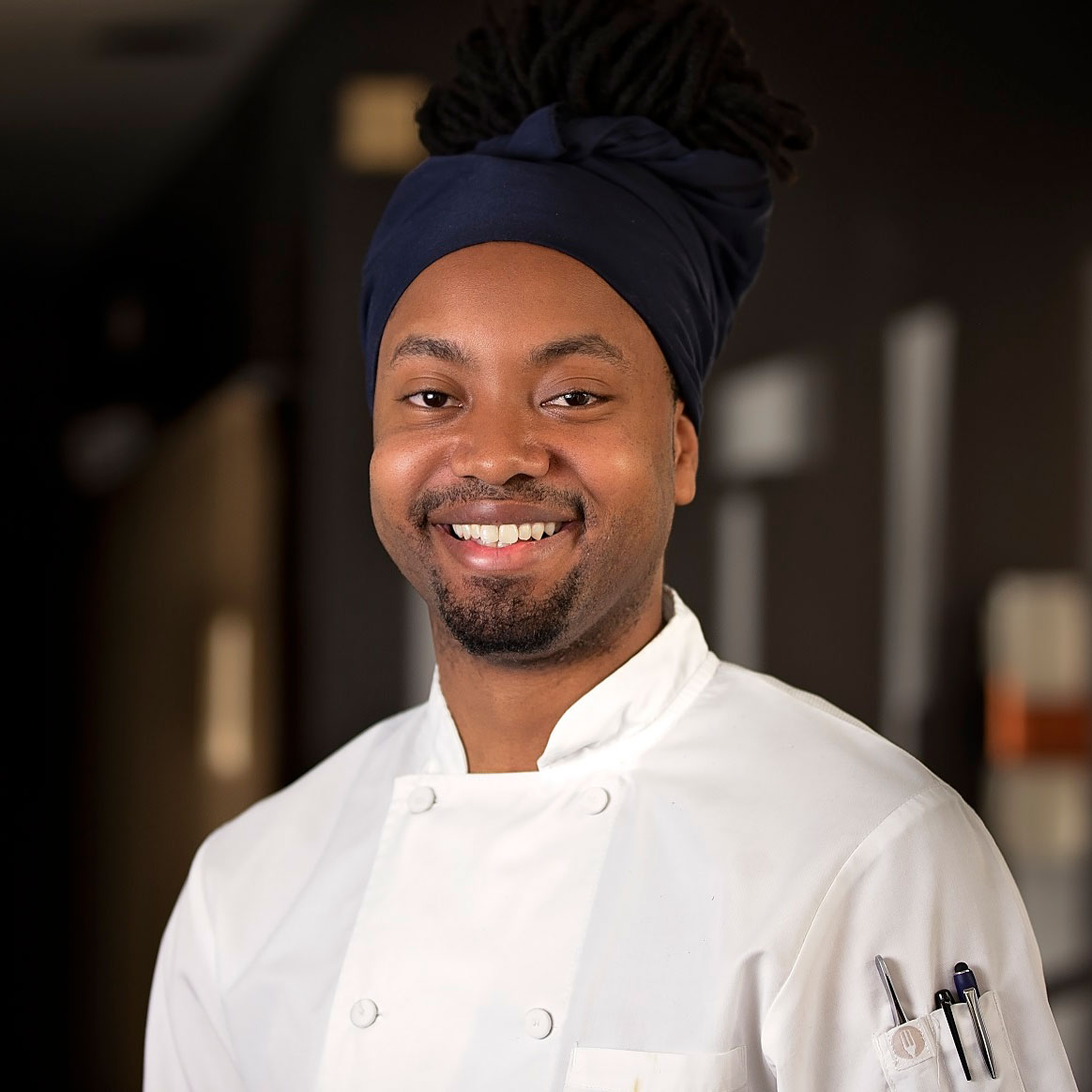Listen to This Article:
The Nobel Prize. The Academy Awards. The Pulitzer Prize. The Michelin Star.
As one of the most prestigious awards in the culinary world, many top chefs dream of leading a restaurant to Michelin Star status. While there is no such thing as a “Michelin Star Chef,” chefs who do lead a restaurant to earn this designation can tout it on their resumes forever.
And earning a star is no small feat; fewer than 4,000 restaurants worldwide could lay claim to a star in 2024. In the United States, just 260 restaurants were Michelin Star-rated in 2024, and of those, only 14 had three stars.
If you count yourself among these aspiring award-winners, roll up your sleeves, sharpen your knife kit, and get ready to learn how to become a Michelin Star chef.
What Is a Michelin Star?
The Michelin Star is a rating system designed to recognize top-notch restaurants and hotels. Establishments can be awarded one to three stars—and in this system, even one star means something special.
And yes, the Michelin Star comes from the same company known for tires and for a mascot (the Michelin Man) whose body is made of stacked tires and who bears a resemblance to the Stay Puft Marshmallow Man in the original Ghostbusters movie.
The connection? Michelin Tire founders and French industrialist brothers Andrew and Edouard Michelin created the first guide in 1900 to encourage people to explore and drive more—and hence, buy more tires. The original guide included a list of restaurants, hotels, mechanics, and gas stations along popular routes in France along with maps and instructions for how to repair and change tires.
The Michelin system began awarding fine dining restaurants with its coveted stars in 1926, and it released its three-star rating system in 1931.
How Does a Chef Get a Michelin Star?
Keep in mind that Michelin stars are awarded to restaurants rather than to chefs. The operation earns the award, and the executive chef, having played a major role in a restaurant’s success, becomes the person tied to the recognition. When a restaurant receives a Michelin star, the executive chef can—and should—take some of the credit.
Today, the Michelin Guide assesses restaurants in select cities around the world. Inspectors visit a restaurant on multiple occasions, during different seasons and at different times, then write a comprehensive report about the total culinary experience, including the quality and presentation of the dishes, among other rating criteria. The group of Michelin inspectors will then meet to analyze the reports and discuss in-depth which restaurants are worthy of a Michelin Star (or two or three).
Criteria Evaluated by Michelin Inspectors
- Quality of products
- Mastery of flavor and cooking techniques
- The personality of the chef represented in the dining experience
- Harmony of the flavors
- Consistency between inspectors’ visits
How to Become A Michelin Star Chef
While there isn’t one clear path to becoming a Michelin Star chef, many of these culinary experts have followed similar trajectories. If you dream of adding a Michelin Star to your list of accomplishments, consider using these six steps as a guide.
1. Start With Culinary Education
It’s true that culinary school isn’t a definitive requirement to become a chef. However, a formal culinary education can provide you with the skills and experiences that many employers expect and potentially speed up your timeline. Whether you opt for an online program or in-person classes, you can explore fundamentals like knife skills and food safety both in the kitchen and during lecture.
At Auguste Escoffier School of Culinary Arts, you may also form a closer connection to your ingredients during the Farm To Table® Experience and learn how to design menus and manage purchasing.
Not only can you gain new knowledge and experience in culinary school, but you’ll be surrounded by talented peers, Chef Instructors and supportive staff. These people are available if you ever want to bounce around an idea or get a little help grasping a new concept.
2. Practice in a Kitchen
After you’ve obtained a culinary education, it’s time to practice in a working kitchen. While an education can get you up to speed on the fundamentals, there’s no substitute for putting in time at a restaurant where you’ll work alongside others in a fast-paced environment and discover how to make decisions on the fly and hone your skills.
Culinary school and real-world experience don’t have to be separate. Escoffier requires its students to complete one or two six-week hands-on industry externships towards the end of their degree or diploma program.
Externships not only can give you a chance to practice your skills, but they also allow you to gain experience working with a specific cuisine of interest and make industry connections. Oftentimes, students find that externships are the stepping stone to a career.
3. Find a Mentor and Study Under Them
No matter where you are in your culinary journey, you’ll benefit from having a mentor who can inspire and guide you. While attending culinary school and working in a kitchen, you may naturally develop this type of valuable relationship with a Chef Instructor, Executive Chef, Sous Chef, or alumnus.
If you don’t have a dedicated mentor, take a deep breath and reach out to a professional you admire. Asking for mentorship demonstrates that you’re serious about advancing your career. Even if the person isn’t able to guide you throughout your culinary journey, they may be able to refer you to others in their network.
Once you find a mentor, don’t think they’ll wave their magic spatula and make your dreams come true—you’ll still need to put in the work. However, mentors can help you establish concrete goals and hold you accountable if you put in mediocre effort. Remember, this isn’t austere criticism, it’s an encouraging reminder that you can do better.
For any chef, a Michelin Star is a career highlight. But some chefs have achieved this highlight multiple times and in multiple restaurants.
The late French chef Joël Robuchon is widely considered the best chef of the modern age, and for good reason—Robuchon’s restaurants earned 31 Michelin Stars across three continents.
Alain Ducasse is another big name, with 21 Michelin Stars to his credit. Ducasse’s establishments feature haute cuisine. In 1999, he opened the culinary school École Ducasse in Paris, and he is also head of more than 30 restaurants.
In the United States, Thomas Keller is the only U.S. chef to operate two three-star restaurants. Keller worked in a number of kitchens around the country before opening his own restaurants in his thirties; in 1994, he opened his now acclaimed restaurant, The French Laundry.
4. Develop Your Soft Skills
Balancing flavors, mincing onions, operating a sous vide machine… all of these could be required chef skills in a professional kitchen environment. But what about clear communication, organization, and self-awareness? That’s right, chefs also need soft skills.
These skills can make you a leader your team can turn to. Even if you conceive of a winning dish and order the finest products, you must be able to manage a team of restaurant employees who can execute the menu day in and day out. Remember, Michelin Star-winning restaurants value consistency as much as flavor.
If anyone can vouch for the importance of leadership, it’s Chef Curtis Duffy, Executive Chef and Owner of Two-Michelin Star restaurant Ever. “I’m the face of the restaurant. But behind me is an army of people that I count on. They’re the ones that really make it happen,” says Duffy. “Their relentless work ethic and their push every single day is what gives me the ability to do what I’m doing now. It gives me the ability to grow the brand and to give them the opportunity to grow with me.”
5. Gain Experience at Top Restaurants
As you gain real world experience, it’s time to take the next step to pursue your dreams. Before you guide a restaurant to Michelin Star status, you should find out how these top kitchens operate. By working in an award-winning restaurant, you’ll be pushed to refine your skills and develop your identity in the kitchen.
Not only will working in a top restaurant give you exposure to top cuisine, but it might also provide you with access to valuable mentors.

Professionals who want to advance in their careers should spend time honing their craft and working their way up through high-level restaurants.
6. Work Your Way Up In the Kitchen
At this point in your journey, you have the education and experience you may need to succeed. But that doesn’t mean it’s time to stop pushing.
If you aim to be an executive chef, you may need to become a commanding and creative leader as well as a talented cook. So always be on the lookout for opportunities to learn from others, push the boundaries, and step into leadership roles.
Once you become an executive chef in a city that’s likely to be visited by Michelin Guide inspectors, keep working. With a solid foundation and lots of perseverance, you’re in a good position to lead your restaurant to that coveted Michelin Star.
Take the First Step to Becoming a Michelin Star Chef
If you think becoming a Michelin Star chef sounds like a lot of work, you’re right! However, when you break this dream down into smaller steps, it seems a bit more obtainable.
By attending Auguste Escoffier School of the Culinary Arts, you can explore the fundamentals of navigating a kitchen and working with ingredients. As you hone your skills beside talented Chef Instructors, you could gain the confidence and skills you need for your culinary externship.
After graduation, you can expect to work your way up through the kitchen, holding roles such as line cook and sous chef. Remember, you don’t become a chef overnight. With education, passion, and determination, you can be better equipped to stand up to any challenge you face. And if you need help, you can always reach out to your former instructors and classmates.
If you’re interested in taking the first step to becoming a chef of a Michelin Star restaurant, or another type of culinary professional, contact us to learn more about how you can pursue a culinary education at Escoffier.
TO LEARN MORE ABOUT HOW TO START OR ADVANCE YOUR CULINARY CAREER, CHECK OUT THESE ARTICLES:
This article was originally published on Feb. 14, 2022 and has since been updated.




